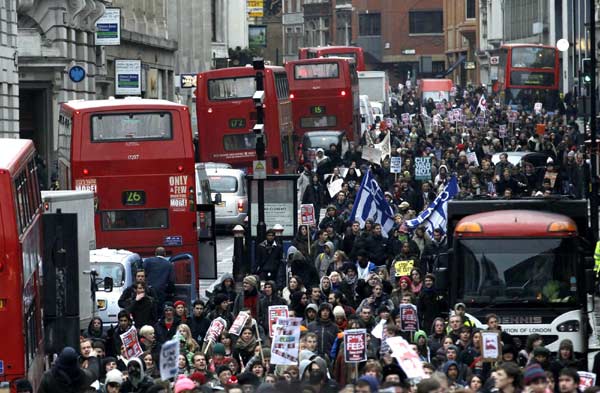Britain's winter of discontent
Britain's Conservative-Liberal coalition government votes on huge cuts in the education budget and a big rise in university tuition fees on December 9. Students are organizing a wave of angry protests culminating in a march on Parliament in an attempt to stop it. The vote is certain to go against the students, but they hope to initiate a movement of unrest against cuts that spreads across the nation.
 |
|
Demonstrators protest in central London November 30, 2010. Thousands of students played a game of cat and mouse with police in central London on Tuesday in a protest against planned rises in university tuition fees. [Agencies via China Daily] |
Government plans for cuts in social spending are supposedly designed to cut the national deficit and prepare Britain for a new wave of economic expansion. The reduction in the social wage provided through the welfare state will reduce consumption for broad sections of society, but private sector investment is increasing and the economy is recovering from the Great Recession of 2007-9. Today's economic recovery is being combined with draconian changes to the social consensus established after the Second World War. Although a reduction in the social wage reduces consumption, Karl Marx explained that capitalists invest because they seek profits; at root it is investment that generates growth, not consumption.
The movement of opposition to the cuts is a crusade to save pensions, welfare rights and education. These rights were the foundation of social peace based on relative stability in class relations. For decades, despite grotesque inequalities, the poorest still received free heath care, education, and a tolerable means of subsistence. Opponents of cuts can certainly claim the moral high ground, as rage against the wealthy and greedy is widespread.
Nowadays there are no ideological theories proposed to justify the need for cuts, almost everyone blames the bankers, the speculators, and wealthy tax-avoiding companies for the crisis. When news broke that mobile phone operator Vodaphone had dodged billions in taxes, "flash mobs" – groups of angry protesters organised via social networks – occupied their shops all around the country, inflicting a huge PR blow on the company.
 0
0 







Go to Forum >>0 Comments